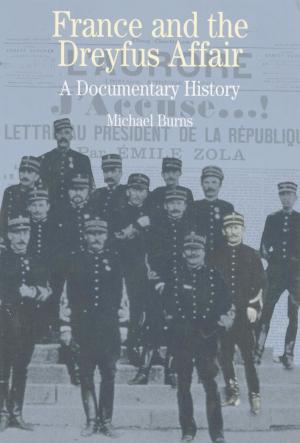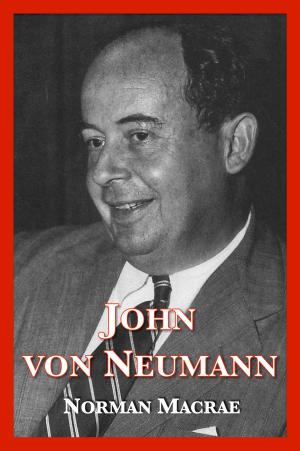A Preponderance of Power: National Security, the Truman Administration, and the Cold War
Nonfiction, Social & Cultural Studies, Political Science, International, International Security, History, Modern, 20th Century, Americas, United States| Author: | Melvyn P. Leffler | ISBN: | 1230002547954 |
| Publisher: | Plunkett Lake Press | Publication: | September 14, 2018 |
| Imprint: | Language: | English |
| Author: | Melvyn P. Leffler |
| ISBN: | 1230002547954 |
| Publisher: | Plunkett Lake Press |
| Publication: | September 14, 2018 |
| Imprint: | |
| Language: | English |
In the United States the Cold War shaped our political culture, our institutions, and our national priorities. Abroad, it influenced the destinies of people everywhere. It divided Europe, split Germany, and engulfed the Third World. It led to a feverish arms race and massive sales of military equipment to poor nations. For at least four decades it left the world in a chronic state of tension where a miscalculation could trigger nuclear holocaust.
Documents, oral histories, and memoirs illuminating the goals, motives, and fears of contemporary U.S. officials were already widely circulated and studied during the Cold War, but in the 1970s a massive declassification of documents from the Army, Navy, Air Force, the Joint Chiefs of Staff, the Department of Defense, and some intelligence agencies reinvigorated historical study of this war which became the definitive conflict of its time. While many historians used these records to explore specialized topics, Melvyn Leffler marshals in this book the considerable available evidence to offer an overall analysis of national security policy during the Truman years and a comprehensive history of that administration’s progressive embroilment in the Cold War.
A Preponderance of Power won the 1992 Robert H. Ferrell Book Prize sponsored by The Society for Historians of American Foreign Relations (SHAFR), the 1992 Herbert Hoover Book Award sponsored by The Herbert Hoover Presidential Library Association and the 1993 Bancroft Prize sponsored by the Friends of the Columbia Libraries.
“Each generation, if it is lucky, is given a book that becomes standard for one of the turning-point eras in American history. The immediate post-1945 years certainly were such an era, and Leffler’s work is such a book. Having exhausted the U.S. records, taken the globe as his province, and exploited the perspective of Communism’s recent collapse, he has written the account from which others must move if they are to contribute to our further understanding of these origins of the cold war.” — Walter LaFeber, Noll Professor of History, Cornell University
“This is a magnificent book. It transcends forty years of historical writing about the origins of the cold war and the evolution of the Truman administration’s policies. Scrupulously documented, it will inevitably become the intellectual fulcrum around which all discussions, arguments, and revisions of cold war historiography henceforth will turn.” — Martin J. Sherwin, Dickson Professor of History, Director of the Nuclear Age History and Humanities Center, Tufts University
“This bold, persuasive book puts the self-conscious expansion of U.S. power where it belongs — at the center of cold war tensions. Leffler effectively establishes that the ‘wise men’ had a coherent world view, devised a grand strategy to satisfy it, and extended U.S. power abroad to meet threats they exaggerated. A gem of a book.” — Thomas G. Paterson, Professor of History, University of Connecticut
“Leffler’s panoramic survey of global developments offers an important reassessment of American policy in the early cold war — one that sees American policy driven as much by an expansive definition of national security as by the threat of Soviet imperialism. As the cold war comes to an end, Leffler presents a fresh appraisal of its origins.” — Michael J. Hogan, Professor of History, Ohio State University, Editor, Diplomatic History
“Magisterial... This book is without question a major achievement. It is a masterly work of synthesis, weaving together in a single coherent study the various and often contradictory trends in previous historical writing on the Cold War’s origins. It is indefatigably researched... and most important, it is an intellectually honest work... A fine book.” — The Atlantic
“A brilliant new book... An invaluable contribution.” — The Nation
“[A Preponderance of Power] remains today [November 2013] the (so-far) definitive history of US behavior in the Cold War” — Eric Alterman, The Nation
“The best book to date on the Truman administration and the origins of the Cold War.” — Detroit Free Press
“A Preponderance of Power will be of immense value to scholars interested in the grand strategy of the Truman administration. Leffler has combined a solid grasp of secondary material with a comprehensive and very carefully documented analysis of primary sources, including a vast array of previously classified documents. The result is not only a more complete record of U.S. policymakers’ thinking about national security but also a more nuanced and sophisticated reconstruction of their concerns and objectives” — Alan C. Lamborn, American Political Science Review
“A monumental work, rich in information and insights.” — R.C. Grogin, Canadian Journal of History
“This massive distillation of the perceptions and policy prescriptions of the national security establishment of the Truman years... is policy history based on years of exhaustive research in government archives and private papers... Leffler’s judgment on Truman’s men and their work is favorable: they were sometimes very wise, nearly always prudent... and foolish primarily in overvaluing the strategic importance of peripheral areas.” — Gaddis Smith, Foreign Affairs
“A good, indeed excellent, narrative history, straightforward and chronological... As a comprehensive and well-documented narrative of the Truman administration’s response to historic challenges beyond our shores, this book will prove indispensable as an up-to-date guide to further research.” — George Botjer, History
“Leffler’s magisterial history of U.S. security policy in the Truman administration... will be widely appealing to political scientists and others grappling with issues in U.S. postwar security and foreign economic policy... Leffler has achieved a powerful synthesis of competing explanations of U.S. Cold War policy and has strongly elucidated U.S. grand strategy... A Preponderance of Power is a highly ambitious, thoughtful, and important work of scholarship, indisputably the outstanding historical synthesis of U.S. foreign policy in the early Cold War era.” — Lynn Eden, International Security
“A remarkable piece of work. The book’s sweep is encyclopedic: it covers both military and foreign policy for the entire period from 1945 to January 1953, and deals systematically with American policy in all the important areas of the world--eastern and western Europe, the Mediterranean, the Middle East, and the Far East as well. The book is based on a vast amount of archival research...” — Marc Trachtenhexg, Orbis
“What sets Leffler’s work apart from that of most of his predecessors is not only its comprehensive coverage of Cold War issues, its exhaustive — at least in American sources — research, and incisive prose, but also the effective integration of political, ideological, economic and strategic analysis.” — Stephen J. Randall, International Journal: Canada’s Journal of Global Policy Analysis
“Massive, brilliant post-glasnost analysis of early cold-war realities... This study of how Truman dealt with a world sealed off to him by FDR is a book and a half.” — Kirkus
“Offering a new slant on the early years of the Cold War, this major reassessment traces the development of national security policy during the Truman administration. Based on a rich vein of recently declassified material, Leffler’s majestic study describes how Harry Truman and his advisers sought to mobilize America’s power in order to deal with the dangers of the postwar world and create a global environment hospitable to U.S. interests and values.” — Publishers Weekly
“In examining the formulation of policy during the Truman administration, Leffler concentrates on the small group of (now unfashionably elite, white, and male) individuals who exercised decision-making responsibility in the late 1940s and early 1950s... We get to know Leffler’s main characters—Harry Truman, Dean Acheson, Nitze, James Forrestal, John McCloy, and half a dozen others—very well. We learn how they saw the world and what they aimed to accomplish... Leffler’s book, [...] is by far the best on its subject.” — H. W. Brands, American Historical Review
“Leffler’s timely book is the product of more than a dozen years of prodigious research and patient investigations into many recently available collections of documents. The result is a valuable assessment of prudent policymakers who formulated the blueprints for US Cold War strategies... Leffler’s interpretation will remain a standard resource for years to come.” — S. Prisco III, Choice Review
In the United States the Cold War shaped our political culture, our institutions, and our national priorities. Abroad, it influenced the destinies of people everywhere. It divided Europe, split Germany, and engulfed the Third World. It led to a feverish arms race and massive sales of military equipment to poor nations. For at least four decades it left the world in a chronic state of tension where a miscalculation could trigger nuclear holocaust.
Documents, oral histories, and memoirs illuminating the goals, motives, and fears of contemporary U.S. officials were already widely circulated and studied during the Cold War, but in the 1970s a massive declassification of documents from the Army, Navy, Air Force, the Joint Chiefs of Staff, the Department of Defense, and some intelligence agencies reinvigorated historical study of this war which became the definitive conflict of its time. While many historians used these records to explore specialized topics, Melvyn Leffler marshals in this book the considerable available evidence to offer an overall analysis of national security policy during the Truman years and a comprehensive history of that administration’s progressive embroilment in the Cold War.
A Preponderance of Power won the 1992 Robert H. Ferrell Book Prize sponsored by The Society for Historians of American Foreign Relations (SHAFR), the 1992 Herbert Hoover Book Award sponsored by The Herbert Hoover Presidential Library Association and the 1993 Bancroft Prize sponsored by the Friends of the Columbia Libraries.
“Each generation, if it is lucky, is given a book that becomes standard for one of the turning-point eras in American history. The immediate post-1945 years certainly were such an era, and Leffler’s work is such a book. Having exhausted the U.S. records, taken the globe as his province, and exploited the perspective of Communism’s recent collapse, he has written the account from which others must move if they are to contribute to our further understanding of these origins of the cold war.” — Walter LaFeber, Noll Professor of History, Cornell University
“This is a magnificent book. It transcends forty years of historical writing about the origins of the cold war and the evolution of the Truman administration’s policies. Scrupulously documented, it will inevitably become the intellectual fulcrum around which all discussions, arguments, and revisions of cold war historiography henceforth will turn.” — Martin J. Sherwin, Dickson Professor of History, Director of the Nuclear Age History and Humanities Center, Tufts University
“This bold, persuasive book puts the self-conscious expansion of U.S. power where it belongs — at the center of cold war tensions. Leffler effectively establishes that the ‘wise men’ had a coherent world view, devised a grand strategy to satisfy it, and extended U.S. power abroad to meet threats they exaggerated. A gem of a book.” — Thomas G. Paterson, Professor of History, University of Connecticut
“Leffler’s panoramic survey of global developments offers an important reassessment of American policy in the early cold war — one that sees American policy driven as much by an expansive definition of national security as by the threat of Soviet imperialism. As the cold war comes to an end, Leffler presents a fresh appraisal of its origins.” — Michael J. Hogan, Professor of History, Ohio State University, Editor, Diplomatic History
“Magisterial... This book is without question a major achievement. It is a masterly work of synthesis, weaving together in a single coherent study the various and often contradictory trends in previous historical writing on the Cold War’s origins. It is indefatigably researched... and most important, it is an intellectually honest work... A fine book.” — The Atlantic
“A brilliant new book... An invaluable contribution.” — The Nation
“[A Preponderance of Power] remains today [November 2013] the (so-far) definitive history of US behavior in the Cold War” — Eric Alterman, The Nation
“The best book to date on the Truman administration and the origins of the Cold War.” — Detroit Free Press
“A Preponderance of Power will be of immense value to scholars interested in the grand strategy of the Truman administration. Leffler has combined a solid grasp of secondary material with a comprehensive and very carefully documented analysis of primary sources, including a vast array of previously classified documents. The result is not only a more complete record of U.S. policymakers’ thinking about national security but also a more nuanced and sophisticated reconstruction of their concerns and objectives” — Alan C. Lamborn, American Political Science Review
“A monumental work, rich in information and insights.” — R.C. Grogin, Canadian Journal of History
“This massive distillation of the perceptions and policy prescriptions of the national security establishment of the Truman years... is policy history based on years of exhaustive research in government archives and private papers... Leffler’s judgment on Truman’s men and their work is favorable: they were sometimes very wise, nearly always prudent... and foolish primarily in overvaluing the strategic importance of peripheral areas.” — Gaddis Smith, Foreign Affairs
“A good, indeed excellent, narrative history, straightforward and chronological... As a comprehensive and well-documented narrative of the Truman administration’s response to historic challenges beyond our shores, this book will prove indispensable as an up-to-date guide to further research.” — George Botjer, History
“Leffler’s magisterial history of U.S. security policy in the Truman administration... will be widely appealing to political scientists and others grappling with issues in U.S. postwar security and foreign economic policy... Leffler has achieved a powerful synthesis of competing explanations of U.S. Cold War policy and has strongly elucidated U.S. grand strategy... A Preponderance of Power is a highly ambitious, thoughtful, and important work of scholarship, indisputably the outstanding historical synthesis of U.S. foreign policy in the early Cold War era.” — Lynn Eden, International Security
“A remarkable piece of work. The book’s sweep is encyclopedic: it covers both military and foreign policy for the entire period from 1945 to January 1953, and deals systematically with American policy in all the important areas of the world--eastern and western Europe, the Mediterranean, the Middle East, and the Far East as well. The book is based on a vast amount of archival research...” — Marc Trachtenhexg, Orbis
“What sets Leffler’s work apart from that of most of his predecessors is not only its comprehensive coverage of Cold War issues, its exhaustive — at least in American sources — research, and incisive prose, but also the effective integration of political, ideological, economic and strategic analysis.” — Stephen J. Randall, International Journal: Canada’s Journal of Global Policy Analysis
“Massive, brilliant post-glasnost analysis of early cold-war realities... This study of how Truman dealt with a world sealed off to him by FDR is a book and a half.” — Kirkus
“Offering a new slant on the early years of the Cold War, this major reassessment traces the development of national security policy during the Truman administration. Based on a rich vein of recently declassified material, Leffler’s majestic study describes how Harry Truman and his advisers sought to mobilize America’s power in order to deal with the dangers of the postwar world and create a global environment hospitable to U.S. interests and values.” — Publishers Weekly
“In examining the formulation of policy during the Truman administration, Leffler concentrates on the small group of (now unfashionably elite, white, and male) individuals who exercised decision-making responsibility in the late 1940s and early 1950s... We get to know Leffler’s main characters—Harry Truman, Dean Acheson, Nitze, James Forrestal, John McCloy, and half a dozen others—very well. We learn how they saw the world and what they aimed to accomplish... Leffler’s book, [...] is by far the best on its subject.” — H. W. Brands, American Historical Review
“Leffler’s timely book is the product of more than a dozen years of prodigious research and patient investigations into many recently available collections of documents. The result is a valuable assessment of prudent policymakers who formulated the blueprints for US Cold War strategies... Leffler’s interpretation will remain a standard resource for years to come.” — S. Prisco III, Choice Review















